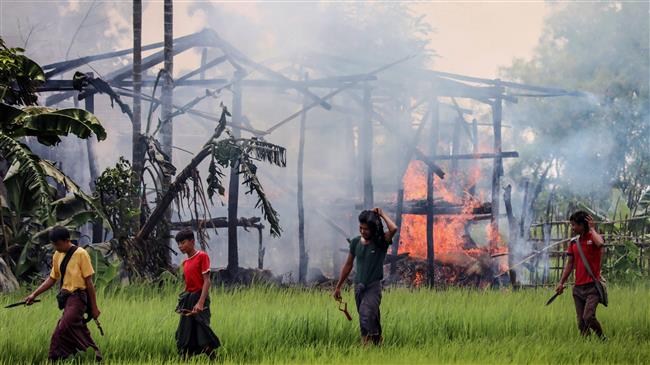
RNA - Myanmarese soldiers and Buddhist mobs, with the quiet backing of the government, have killed thousands of minority Rohingya Muslims in Myanmar’s western Rakhine State in what has been described by the UN as “ethnic cleansing.” Hundreds of thousands of other Rohingyas have survived only by fleeing to neighboring Bangladesh.
The Myanmarese government has struck a deal with Bangladesh to have the Muslims returned, but both the Rohingya refugees and the Bangladeshi government are reluctant as there is no guarantee for their safety.
The government in Myanmar has been changing the demography of Rakhine in the absence of the Rohingya, shuttling Buddhists from elsewhere to the region and housing them in hastily-built settlements.
Before the settlements were set up, the government bulldozed the Rohingya villages — most of them already burnt down in the campaign of violence — to make room, satellite imagery showed.
“From what I’ve seen and heard… conditions are not conducive to return,” Ursula Mueller, assistant secretary-general for humanitarian affairs, said in Yangon on Sunday, after six days of touring Myanmar and talking to government officials. “I witnessed areas where villages were burned down and bulldozed... I’ve not seen or heard that there are any preparations for people to go to their places of origin.”
Mueller is the most senior UN official to have visited Myanmar this year. She was reportedly granted rare access to visit the most affected areas in Rakhine State, and she met with the military-controlled ministers of defense and border affairs, as well as the country’s de-facto leader Aung San Suu Kyi.
“I asked [Myanmarese officials] to end the violence… and that the return of the refugees from [Bangladeshi refugee camps in] Cox’s Bazar is to be on a voluntary, dignified way,” Mueller said.
It was unclear whether the Myanmarese authorities had heeded Mueller’s demands. They have been consistently denying that any violence has taken place against the Rohingya at all, despite the satellite images as well as numerous witness accounts of horrific violence.
According to Press TV, international medics who have examined the Rohingya refugees in Bangladesh have said the wounds on the bodies of the Muslims match their accounts of terrible violence.
The terror campaign in Myanmar began in late 2016, when the military laid siege to Rakhine and soldiers and Buddhist extremists began running amok. That campaign intensified in August last year.
Suu Kyi, a Nobel Peace Prize winner, has refused to hold the perpetrators to account or even admit to the atrocities. She has even refused to recognize the Rohingya — who have lived in Myanmar for decades — as citizens.
847/940